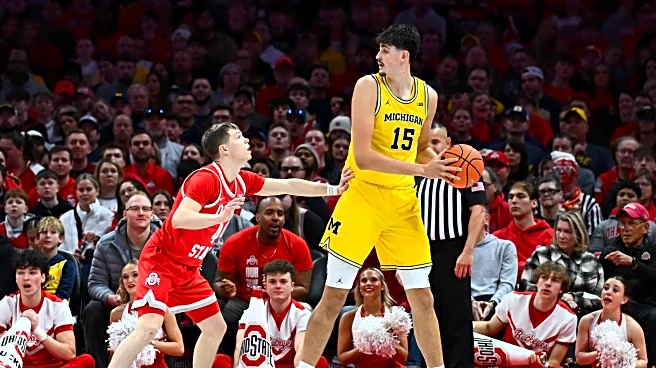What's Happening?
A group of activists from the Gaza aid flotilla, recently deported by Israel, have alleged mistreatment during their detention. The activists, including Italian participant Lorenzo D’Agostino, claim they were subjected to harsh conditions, such as being forced to kneel on concrete for extended periods and being left in cold temperatures with minimal clothing. They also reported having their belongings seized and being mocked. Israel has denied these allegations, labeling them as 'brazen lies' and asserting that all legal rights were upheld. The flotilla, which included prominent figures like climate activist Greta Thunberg, aimed to break the Israeli blockade of Gaza by delivering humanitarian aid. The Israeli government maintains that the blockade is legal and views the flotilla as a provocation.
Why It's Important?
The allegations of mistreatment have sparked international attention and criticism, potentially affecting Israel's diplomatic relations. The involvement of high-profile activists like Greta Thunberg amplifies the issue, drawing global media coverage and public scrutiny. The situation highlights ongoing tensions surrounding the Israeli blockade of Gaza, a contentious issue in international politics. The claims of mistreatment could lead to increased pressure on Israel from human rights organizations and allied nations to reassess its policies and treatment of detainees. This incident also underscores the broader humanitarian concerns in the region, as activists continue to challenge the blockade and advocate for Palestinian rights.
What's Next?
The international community may call for independent investigations into the allegations of mistreatment. Human rights organizations could increase their advocacy efforts, urging Israel to allow humanitarian aid into Gaza and to ensure the humane treatment of detainees. Diplomatic discussions may arise between Israel and its allies, particularly those whose citizens were involved in the flotilla. The Israeli government might face internal and external pressure to address these allegations transparently. Additionally, the incident could influence future humanitarian missions and the strategies employed by activists to challenge the blockade.
Beyond the Headlines
The incident raises ethical questions about the treatment of activists and the balance between national security and human rights. It also highlights the role of international activism in drawing attention to geopolitical conflicts. The use of social media and public figures in advocacy efforts demonstrates the evolving landscape of global activism, where digital platforms amplify voices and mobilize support. The situation may lead to long-term shifts in how humanitarian aid is delivered to conflict zones and how governments respond to international pressure.











